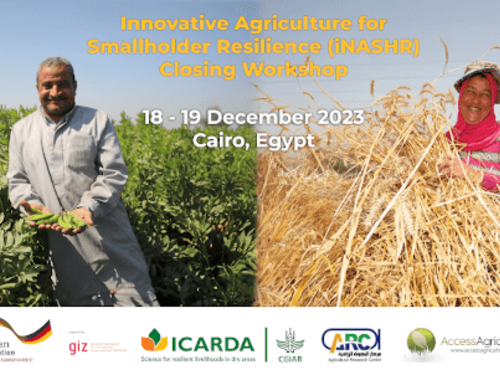Despite this, 18 teams of Entrepreneurs for Rural Access (ERAs) serving as digital extension service providers were able to reach more than 60,000 people in rural communities between 2021 and 2023.
- Three specially commissioned “farmer-to-farmer” style training videos were produced (see at the bottom of this blog post),
- and 60 other relevant Access Agriculture videos were translated into Arabic and shown to farmers.
- These active service providers, half of whom are women, used a solar-powered smart projector to reach communities where access to power supply, internet connection and mobile phone signal can be challenging.
Please find hereunder three related videos – Video learning for rural women & youth in Egypt; Youth-led knowledge exchange in rural Egypt; and Closing iNASHR Workshop with Josephine Rodgers, Executive Director of Access Agriculture – which are now on EcoAgtube to learn more about the exciting achievements of this project. The videos are in Arabic with subtitles in English.
“We were twenty people attending the video screening on raised beds. This was a new practice to us as we traditionally use furrow irrigation. Only five of us decided to try the new dimensions required from the video. With our improved harvests, the 15 other video show attendees all decided to follow in our footsteps the next year. Now I can proudly say that two years later, half my village irrigates this way now without question.” Mohamed,farmer from Beni Suef, Egypt
“Feed prices are continually increasing and many women in my community stopped raising poultry altogether. The price of chicken is so high now that many families can no longer afford to make their kids egg sandwiches anymore. Then I attended a village video show organized by a local charity where I learned the benefits of Azolla from Indian farmers. We’ve created over 200 ponds in our community and sell our eggs at a lower price than those in the market — so that we can afford to feed our children in our village again. The eggs taste really good too.” Mariam,rural woman from Sharkia, Egypt
PAEPARD blog post 18 December 2024. Closing celebration of the 'Innovative Small-holder Agriculture Resilience' (iNASHR) project
Related article
Innovating Digital Extension Delivery Services in Rural Egypt
Supporting the co-construction of knowledge and inclusive growth for marginalized farmers through farmer-to-farmer videos and last-mile delivery
The project under the leadership of Bezaiet Dessalegn ran in Egypt until the end of 2023 (see Water innovations that work | ICARDA).
Three farmer-to-farmer videos were produced that focus on the core technology and innovative solutions, including the raised bed technology, crop rotation, and land consolidation.
Three farmer-to-farmer videos were produced that focus on the core technology and innovative solutions, including the raised bed technology, crop rotation, and land consolidation.
- The video production relied on the farmer-to-farmer approach which allows farmers to share important knowledge based on their own experience and in their own words.
- The farmers not only explain the solutions but also describe the challenges well so that fellow farmers watching the video can adapt the technology to meet their own needs.
- The video production also involved desk reviews and research, key interviews with experts, and running small group discussions among extension workers and lead farmers on selected video topics.







No comments:
Post a Comment